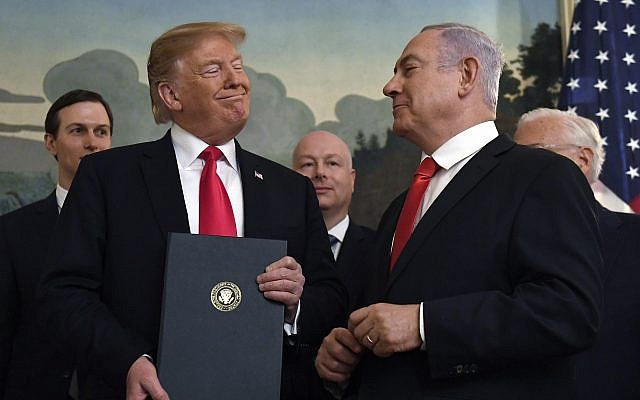The PM always veers rightward before elections, skeptics say, noting that just last year he fought the very plan he is now proposing. But things have changed since

Prime Minister Benjamin Netanyahu on Saturday evening dropped a bombshell with potentially dramatic political, diplomatic and security-related ramifications for Israel and the entire region — or was it just an empty election promise?
“I am going to apply Israeli sovereignty, but I don’t distinguish between settlement blocs and isolated settlements,” he said in an interview with Channel 12, in what cannot be understood as anything but a vow to annex a significant part of the West Bank.
“We’ll go to the next stage,” he announced.
Some have taken Netanyahu at his word, saying he has considered a partial West Bank annexation for some time now and might actually act on it, after the April 9 elections and the subsequent publication of the US administration’s plan for Israeli-Palestinian peace.
“I think that releasing a strategic and historic decision in an election campaign bubble is not serious and (is) irresponsible,” his chief political rival, Blue and White party leader Benny Gantz, said Sunday.
But most politicians and pundits shrugged the statement off as a cheap ploy to endear himself to right-wing voters. Beyond the timing of the statement, just three days before Israelis head to the polls, and the fact that major policy pronouncements usually get a bit more fanfare that seemingly off the cuff comments in a TV interview, is the fact that annexing settlements goes against everything Netanyahu has said for years.
The comments failed to cause a major stir in Israel, where many remember how on March 16, 2015 — one day before the last Knesset election — Netanyahu declared that no Palestinian state would be established under his watch, which stood in opposition to his previous endorsement of a two-state solution.

Shortly after the election, however, he changed tune once more and went back to his commitment to the principle of two-states for two peoples (a formula he eventually abandoned in early 2017, shortly after Donald Trump entered the White House).
Netanyahu routinely veers rightward in the final days of an election campaign. Indeed, raising the prospect of Israel annexing the settlements is a smart move, politically speaking: By joining the pro-annexation camp, Netanyahu all but erases any substantial difference between his Likud and the New Right and the Union of Right Wing Parties, thus making his own party more attractive to hard-right voters who otherwise would have opted for the more hawkish alternatives.
The annexations statement is the second part of a one-two punch, with Likud also warning potential voters for smaller parties that Netanyahu could lose the chance to form a coalition without Likud being made the largest party.
The result is liable to decimate his potential allies, with URWP and New Right hitting the panic button in response.
“Netanyahu decided to wipe out New Right in order to form a ‘peacenik’ government with [Yair] Lapid and Gantz,” New Right leader Naftali Bennett warned on Facebook Sunday night.
Furthermore, the prime minister’s promise was made not in a speech or a declaration but in response to a television interview, and only after veteran political reporter Rina Matzliah put him in a corner him by asking why he has not done anything to advance Israeli sovereignty over any part of the West Bank.

Statesmen planning a move as dramatic as an annexation of the settlements — which would inevitable draw a torrent of international condemnation, possibly including the threat of sanctions — usually can be expected to announce their intentions in a somewhat more formal context than an interview.
But the most convincing argument against taking Netanyahu’s promise at face value is the indisputable fact Netanyahu has long fought against any and all legislative attempts to annex all or major parts of the West Bank beyond the main blocs.
Netanyahu has never spoken about annexing all West Bank settlements. In the past, he even floated the idea of leaving settlers in place under Palestinian rule in a future peace agreement.
In January 2017, he pushed back against attempts by Bennett and others to annex Ma’ale Adumim and other area. Tzachi Hanegbi, a close Netanyahu ally, said at the time such a move would be “a disaster” for the country.
And in February 2018, he buried the so-called Sovereignty Bill, proposed by first-time legislators Yoav Kisch (Likud) and Bezalel Smotrich (Jewish Home), which would have done exactly what Netanyahu now vows to do after the elections: applying Israeli laws in all the settlements from teeming Ma’ale Adumim to the hilltop of Ma’ale Michmash.

In an awkward bid to defend his opposition to the bill, Netanyahu at the time declared that, “for a while now I’ve been talking about it with the Americans.”
Indeed, one of his guiding principles on this issue is “optimal coordination with the Americans,” he told lawmakers in the Knesset.
But the White House did not like Netanyahu’s claim at all, indicating that the idea of unilaterally applying sovereignty over the West Bank was not part of the administration’s peace plan.
“Reports that the United States discussed with Israel an annexation plan for the West Bank are false,” then-spokesman Josh Raffel said. “The United States and Israel have never discussed such a proposal, and the President’s focus remains squarely on his Israeli-Palestinian peace initiative.”
Raffel’s rare on-record rebuke became the first, and pretty much only, public disagreement between Netanyahu’s government and the administration of Donald Trump.
There are indications, though, that Netanyahu may be looking to annex if not all settlements, then at least the major blocs.
A few things have happened since the February 2018 annexation gaffe that might indicate that he could actually obtain Trump’s okay for a partial West Bank annexation, most importantly his recognition of Israeli sovereignty over the Golan Heights last month.

If the president spontaneously decided to back Israel’s claim over a territory that clearly belonged to another state — Syria — before Israel captured it, Netanyahu may be thinking he could do the same for the West Bank, which everyone agrees was not part of a sovereign state before Israel snagged it in the 1967 Six Day War.
“There is a very important principle in international life: When you start wars of aggression, you lose territory; do not come and claim it afterwards. It belongs to us,” he said last month as he returned from Washington.
A few hours later, a senior Israeli official, who was identified by The New York Times as Netanyahu himself, stressed that any occupied territory that was “captured in a defensive war” belongs to the victor, clearly hinting at a possible West Bank annexation.
Netanyahu may be employing some magical thinking in surmising that he can draw legal precedent from the Golan move. Trump himself told a group of Jewish Republicans on Saturday that the decision to recognize Israel’s effective annexation was essentially made on the fly and based on security implications alone.
Nonetheless, Netanyahu has told associates he thinks Trump would back a partial West Bank annexation move, according to a Channel 13 news report.
Well-placed Israeli and American sources told The Times of Israel recentlythat Netanyahu could seek to annex at least the major settlement blocs — such as the Etzion Bloc, Ma’ale Adumim and Ariel, possibly in exchange for assurances from right-wing coalition partners to back legislation that would protect him from criminal prosecution, assuming he is given a chance to form a coalition after Tuesday’s vote.
While the US might not initially be in favor of a unilateral Israeli annexation of all settlements, after the Palestinians turn down the White House’s peace plan, as they are widely expected to, Netanyahu could suggest such a sweeping move in response to Ramallah’s intransigence.
Angry about the rejection, Trump may well be inclined to give Israel green light for annexation.
Even if he is serious about pushing ahead with annexation, though, all bets will be off should Netanyahu end up having to turn to the center to form a coalition, which could happen if any of his right-wing allies fall below the electoral threshold.
Even if the New Right and UWRP are only weakened, they may not be able to hold Netanyahu’s feet to the fire on the promise. That may only become clear once coalition negotiations are in full swing.
But by making his annexation comments and possibly stealing at least some thunder from his likely partners on the right, he might have made sure that he never actually has to go through with it.
As reported by The Times of Israel
